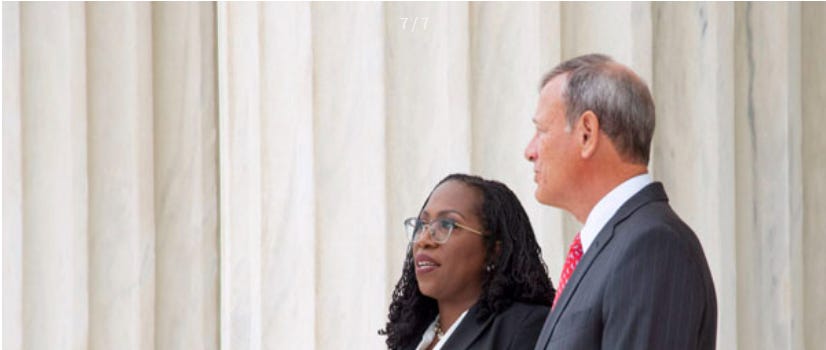Last Week in Federal Appeals (No. 35)
Appellate decisions from the week of October 17-21, 2022
This month marks the beginning of a new Supreme Court term—Justice Jackson’s first on the Court and the first since Justice Breyer’s retirement.
“With a full heart, I accept the solemn responsibility of supporting and defending the Constitution of the United States and administering justice without fear or favor, so help me God. I am truly grateful to be part of the promise of our great Nation. I extend my sincerest thanks to all of my new colleagues for their warm and gracious welcome.”
~Justice Katanji Brown Jackson
“I am glad for America. [Justic Jackson] will interpret the law wisely and fairly, helping that law to work better for the American people.”
~Senior Associate Justice Steven Breyer
“[Justice Breyer] believed in the power of relationships, and he believed in the power of reason. . . .It didn’t always work. Not in every case, and not every year. But there was something quite magnificent and really good for the court in having somebody who would just come back and do the same thing again and again.”
~ Justice Elena Kagan on Justice Breyer’s retirement.
Decision Summaries
Supreme Court of the United States
Orders and Pending Cases
Justice Barrett, in her capacity as Circuit Justice for the Seventh Circuit, denied a taxpayer group’s request to stay the Biden administration’s student loan forgiveness program. (That said, the Eighth District issued an order on Friday staying the program and asking for briefing early this week.)
Senator Lindsay Graham asked the Supreme Court to block a Georgia prosecutor’s attempt to enforce a subpoena issued as part of a state-law, criminal election-interference investigation.
Fifth Circuit
Community Financial Services Association v. CFPB
The CFBP was created in the aftermath of the 2008 financial crisis and is funded in a unique way: rather than recieving money through yearly Congressional appropriations, the CFBP requests and recieves funding from the Federal Reserve. The Fifth Circuit held that this mechanism violates the Constitution because Congress cannot abdicate its appropriations power by effectively allowing the CFBP to set its own budget.
Seventh Circuit
United States v. Harris
In this case, a defendant appealed from a judgment that imposed a sentence different from the one the district court announced at sentencing. The government argued that the defendant’s appeal waiver in his plea agreement barred his appeal. The Seventh Circuit disagreed, holding that the defendant was not challenging his sentence but merely asking that the sentence announced be imposed. Appeal waivers, the panel explained, do not typically apply in those circumstances.
The panel also held that the trial court did not plainly error by holding a trial during the early days of the COVID-19 pandemic.
Eighth Circuit
Missouri v. Biden
Thirteen states filed a lawsuit challenging President Biden’s executive order reinstating the Interagency Working Group on the Social Costs of Greenhouse Gases, arguing among other things that the group violated the separation of pwoers. The Eighth District held that the states lacked standing to bring this challenge based only on their generalized disagreement with the Working Group’s efforts.
Ninth Circuit
Planned Parenthood v. Newman
The Ninth Circuit held that the First Amendment did not categorically foreclose damages against journalists who infiltrated various meetings and gatherings of Planned Parenthood, recorded the proceedings, and then published those recordings online. However, the panel overturned a jury’s verdict concluding that the journalists’ conduct violated the Federal Wiretap Act.
Peck v. Mono
The Ninth Circuit affirmed a district court’s decision granting qualified to officers who fatally shot a man who was acting erratically. The panel explained that the plaintiff’s evidence suggested that, although the man was in the presence of a firearm, he did not pick it up or otherwise pose an immediate threat to the officers’ safety.
Eleventh Circuit
Jane Doe v. Swearingen
The Eleventh Circuit revived a claim by several plaintiffs who argued that Florida’s Sex Offender Registry violates the constitution. The panel held that the district court erred when it held the plaintiffs’ claims were time-barred, because it failed to consider “whether the plaintiffs, who are subject to the registration requirements day after day, were continually injured by the requirements within the statutory period.”
Any opinions expressed here are my own. This article is not legal advice; if you have a legal issue, you should consult an attorney.
If you liked this article or have thoughts about it, please like or comment below (or email me at breese@flannerygeorgalis.com) and consider sharing it with your friends and network.






